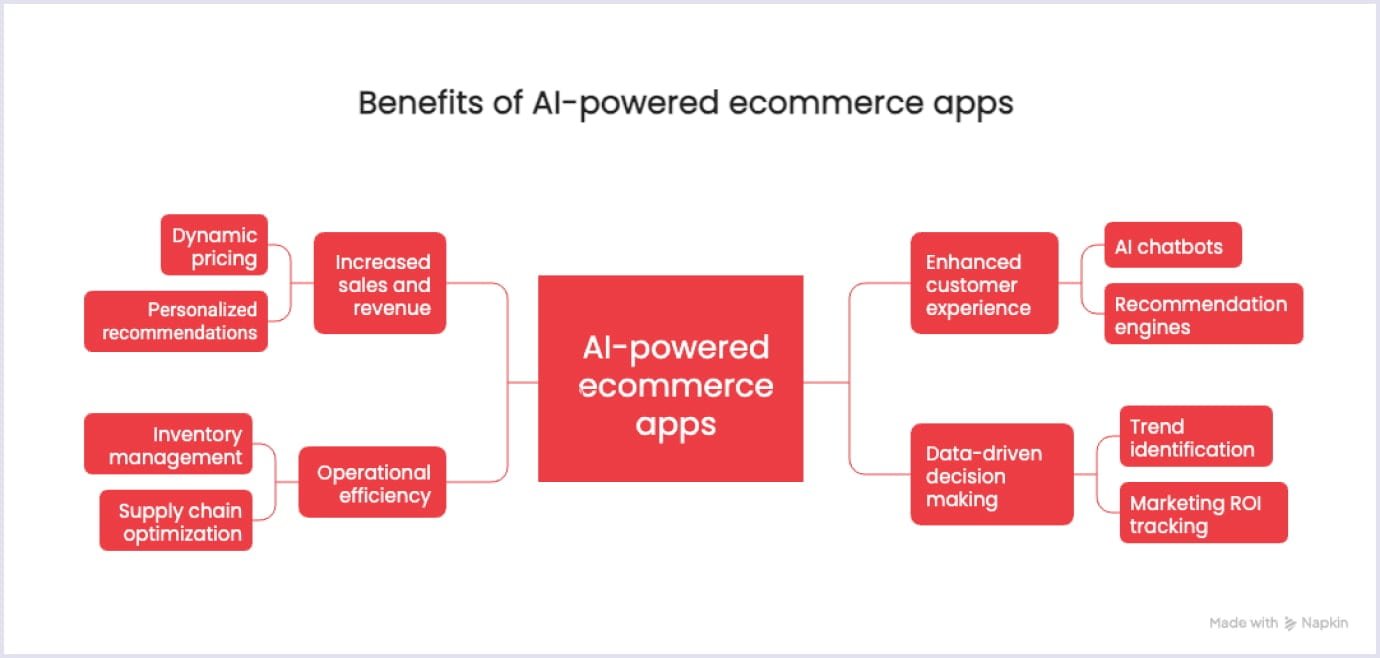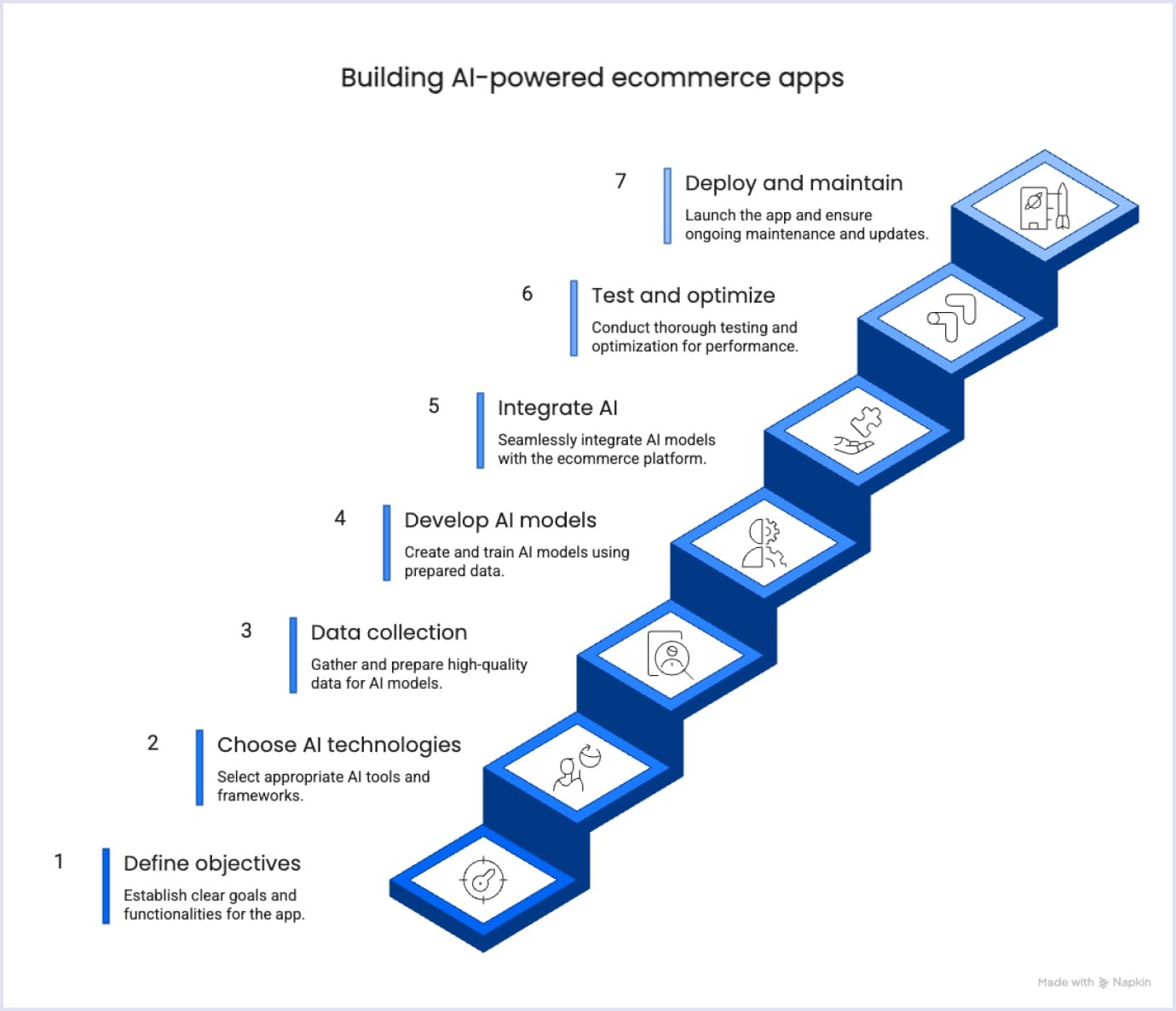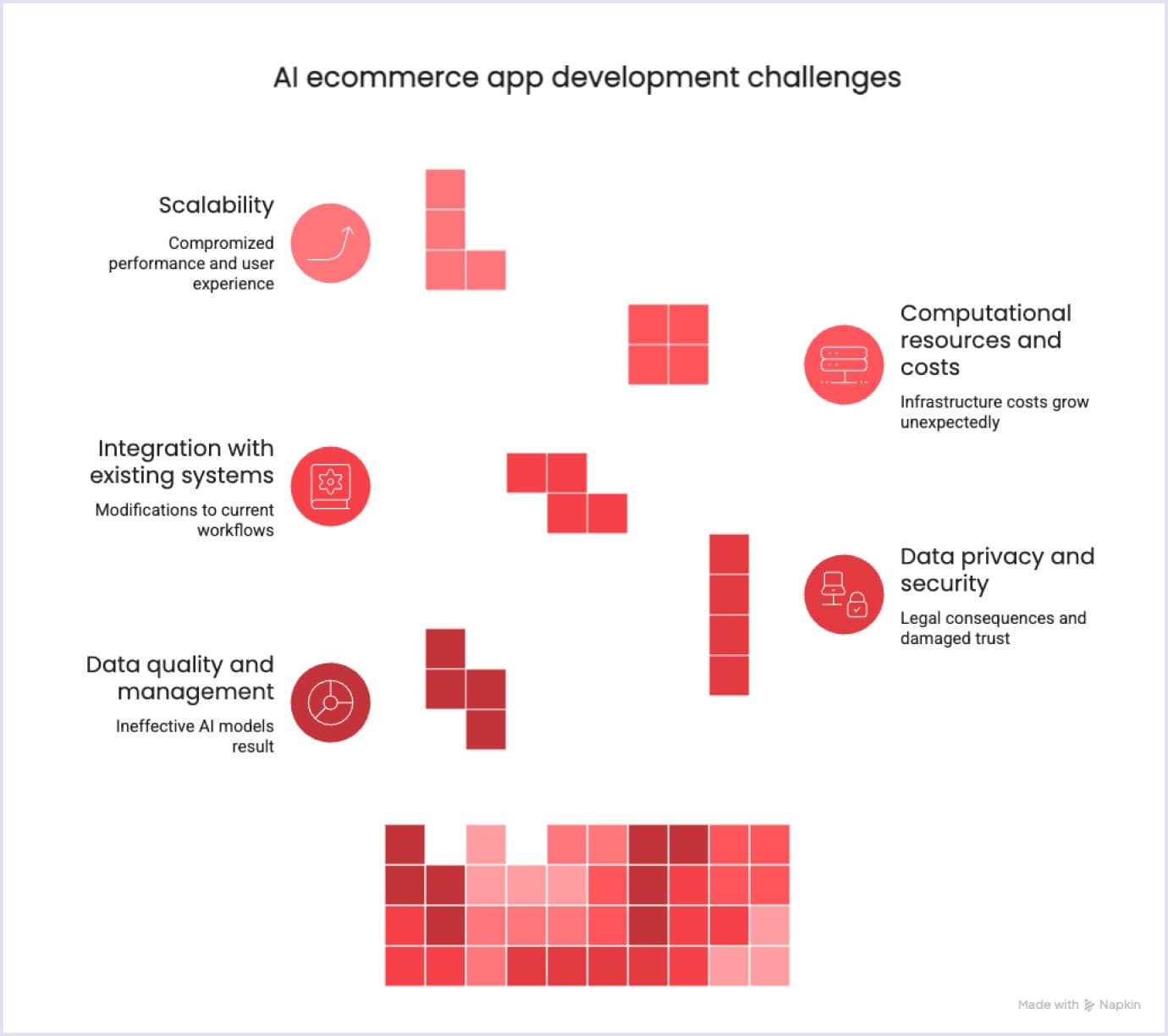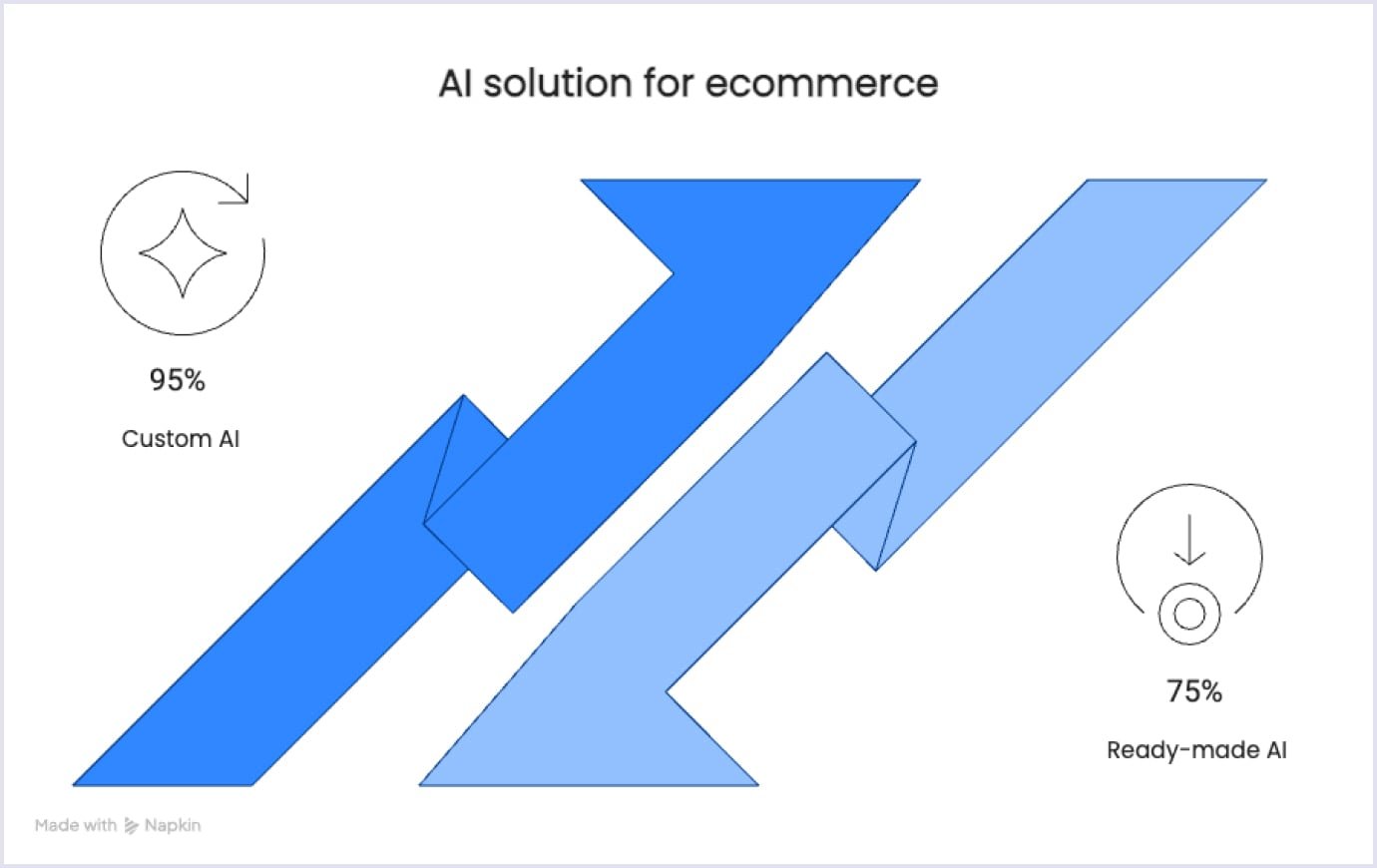Every ecommerce business wants higher sales, lower costs, and loyal customers. AI-powered ecommerce apps deliver all three by transforming online shopping into smarter, faster, and more profitable experiences.
With machine learning (ML), natural language processing (NLP), and predictive analytics, artificial intelligence in ecommerce helps businesses automate processes, personalize customer journeys, and scale efficiently. It’s no surprise that 80% of shoppers are more likely to buy from stores offering personalized experiences, and this is exactly where AI makes the biggest impact.
From intelligent chatbots that provide instant 24/7 support to AI-driven recommendation engines and dynamic pricing models, modern AI ecommerce solutions improve customer satisfaction while maximizing revenue. Imagine a customer who opens your app, sees exactly what they want, and checks out in seconds, behind this seamless experience is AI.
In this guide, we’ll explore the key benefits of AI in ecommerce apps and share a clear roadmap for building an AI-powered ecommerce platform that drives growth and long-term success.
Benefits of AI-powered ecommerce apps

Increased sales and revenue
AI ecommerce apps directly impact the bottom line by turning customer data into actionable insights. Instead of generic promotions, AI-powered ecommerce solutions use dynamic pricing and personalized product recommendations tailored to real user behavior.
Artificial intelligence in ecommerce analyzes browsing patterns, purchase history, and seasonal demand to predict what customers want next. This precision leads to higher average order value, better conversion rates, and sustained revenue growth that traditional methods cannot match.
Enhanced customer experience
Customer loyalty starts with seamless shopping experiences, and AI in ecommerce apps delivers exactly that. Natural language processing powers AI chatbots and virtual assistants, enabling instant 24/7 support without overwhelming human teams.
Recommendation engines suggest relevant products based on browsing and purchase data, while advanced AI search features interpret complex queries and provide accurate results. These personalized, frictionless interactions build trust, improve satisfaction, and drive repeat purchases in a competitive ecommerce market.
Operational efficiency
Operational costs are one of the biggest challenges in ecommerce, and AI-powered apps provide efficient solutions. AI-driven inventory management predicts demand trends and automatically adjusts stock levels, reducing both overstock and stockouts.
Supply chains benefit from optimized delivery routes and lower shipping costs, while automated order processing minimizes errors. These ecommerce AI solutions streamline processes, cut overhead, and free up resources for innovation and business growth.
Data-driven decision making
Scaling an ecommerce business requires more than intuition, it requires data. AI for ecommerce business delivers deep analytics by uncovering trends across massive datasets. From identifying future bestsellers to tracking marketing ROI, AI-powered ecommerce platforms highlight opportunities and risks with unmatched accuracy.
Businesses gain the ability to reallocate budgets wisely, refine customer strategies, and stay ahead of competitors. This level of data-driven decision-making is why artificial intelligence in ecommerce is becoming a standard for sustainable growth.

Steps to building AI-powered ecommerce apps
Adding an AI in ecommerce app involves a structured process that ensures the integration of advanced technologies to enhance user experience, streamline operations, and boost sales. So, here’s an approximate plan for how to use AI in ecommerce applications.

Step 1: Define objectives and requirements
The first step in AI development services is to define the objectives and set the limits clearly. Clarifying your goals for the app will steer the development process and establish measurable objectives. Therefore, it's essential to determine key targets beforehand. For instance, you may want to:
- Improve customer engagement through personalized recommendations and customer support;
- Increase sales via targeted marketing and dynamic pricing;
- Enhance operations using automated inventory and supply chain management.
Once objectives are set, outline the specific functionalities the app should have. The options are endless: 24/7 support with chatbots, tailored recommendations, predictive analytics for inventory handling, and a lot more.
Step 2: Choose the right AI technologies
The AI tools market grows extremely fast, offering diverse tools to enhance various parts of your software. Thus, the selection itself became a separate important step in adding AI in ecommerce apps.
Based on your defined objectives and functionalities, you may need to leverage different AI tools and frameworks. They are often divided into:
- Machine learning for predictive analytics and personalized recommendations;
- Natural language processing for chatbots and virtual assistants;
- Computer vision for image recognition and visual search features;
- Deep learning for advanced data analysis and pattern recognition.
Explore modern AI platforms to shortlist the best fit for your project. Popular choices today include TensorFlow, PyTorch, Scikit-learn, and Keras for machine learning and deep learning tasks; OpenAI API and Google Cloud AI for large-scale AI integration; and Dialogflow, Rasa, or Amazon Lex for natural language processing and conversational AI.
Step 3: Data collection and preparation
No AI-powered application is useful without data. Therefore, gathering and preparing high-quality data is paramount if you want to build serious AI models. Organizing vast arrays of data is another challenge, though. To handle it, divide the process into milestones:
- Gather. Gather data from diverse sources like customer interactions, sales records, and website analytics. Ensure this data is relevant and representative of the use cases you intend to address.
- Clean. Clean the collected data to remove inconsistencies, spam, errors, and duplicates. This step is crucial for ensuring the accuracy and reliability of your AI models.
- Label. Label the data to help AI algorithms understand and learn from it. For example, tagging products with categories and attributes can improve recommendation systems.
Step 4: Develop AI models
With your data prepared, the next step is to develop the AI models that will power your ecommerce app. You can start by choosing the appropriate algorithms for your AI tasks. For instance, collaborative filtering algorithms can be used for recommendations or neural networks for image recognition.
Regardless of the AI model you use, it has to be trained with previously prepared data. In fact, you simply need to feed the data into the algorithms and allow them to learn patterns and relationships.
Lastly, validate your models to ensure they perform well on unseen data. This helps identify overfitting and other issues.
Read also: 11 Brilliant B2B Ecommerce Trends in 2025 and Beyond
Step 5: Integrate AI with eсommerce platform
After all the preparation is done, integrating the developed AI models with your ecommerce platform is the next natural step. Usually, it starts with creating APIs that allow your AI models to communicate with your ecommerce AI platform. This enables functionalities like real-time recommendations and dynamic pricing.
All AI functionalities should be seamlessly integrated into your app's user interface, providing a smooth and intuitive user experience. The same goes for backend systems, as it is where all the computation happens, especially if you plan to implement inventory management and order processing.

Step 6: Test and optimize
Testing and optimization are essential to ensure your ecommerce AI app functions as intended. Although it sounds simple, quality assurance services include a lot of different techniques to check every corner of your app. Some of them include:
- Performance testing, which implies testing the app under different conditions to ensure it can handle real-world usage and traffic.
- User testing, which helps to gather feedback on the AI functionalities and overall user experience.
- Overall optimization, which aims to continuously improve your AI models and app performance based on testing results and user feedback.
Step 7: Deployment and maintenance
Once everything is done, it is time to deploy your app upgraded with shiny new AI integrations. However, after the deployment, the work doesn’t end. Instead, monitoring and maintenance take place.
They include tracking performance metrics and user interactions. Based on the feedback, your software development partner then rolls out updates and fixes, featuring new functionality and improvements in existing features.
Challenges and considerations
While AI-powered ecommerce apps offer numerous benefits, their development and implementation come with a set of challenges for which you should account. Here are the most common ones.

Data quality and management
Challenge: AI models rely heavily on large volumes of high-quality data. Poor data quality, including inaccuracies, inconsistencies, and lack of relevant data, can lead to ineffective AI models.
Consideration: A few tips can help maintain data quality. First, ensure robust data collection and management processes. Also, regularly clean and update data and employ data validation techniques to maintain accuracy. Lastly, consider investing in tools and practices that facilitate efficient data handling and storage.
Data privacy and security
Challenge: Working with tons of data is always associated with privacy and security concerns. For this reason, data protection regulations exist which you should obey. Non-compliance with them can result in legal consequences and detrimental damage in terms of trust and credibility.
Consideration: Implement strong data encryption and security protocols to protect sensitive information. Make sure your software complies with data protection regulations such as the General Data Protection Regulation (GDPR). Educate your team about data privacy best practices and maintain transparent data usage policies.
Integration with existing systems
Challenge: Integrating AI models with existing ecommerce platforms and legacy systems can be complex and time-consuming, often requiring significant modifications to current workflows. Developers often need to restructure apps, change a lot of legacy code, and adapt the app’s architecture to support AI tools.
Consideration: To avoid the challenge, at least partially, plan for integration from the outset. Choose AI tools and frameworks that are compatible with your existing infrastructure. Work closely with your IT team or development partner to ensure smooth integration and minimal disruption to ongoing operations.
Computational resources and costs
Challenge: Developing and deploying AI models requires substantial computational powers. The costs associated with infrastructure, including cloud services and hardware, can grow unexpectedly huge.
Consideration: Evaluate the cost-benefit ratio of different AI solutions. Consider using cloud-based AI services that offer scalability and reduce upfront infrastructure costs. Optimize AI models to be efficient and resource-conscious.
Scalability
Challenge: As your business grows, your app and AI you introduced should be able to handle higher data volumes without compromising performance. Even AI tools have limitations and going beyond them can significantly damage user experience, performance and other aspects.
Consideration: Since the very start, design your AI solutions with scalability in mind. Use upgradable cloud services and modular architectures that can grow with your business. After the deployment, monitor performance and make necessary adjustments to handle increased demand efficiently.
Choosing between custom AI development vs. ready-made AI tools
When integrating AI in ecommerce apps, businesses face a critical choice: adopt ready-made AI tools or invest in custom AI development.

Both approaches have clear strengths, but their long-term impact differs greatly:
- Ready-made AI tools (like pre-built chatbots, analytics dashboards, or recommendation engines) offer speed and simplicity. They are cost-effective at the start, quick to deploy, and ideal for small ecommerce platforms testing AI-driven features. However, they are limited to generic use cases. Scalability is constrained, customization options are narrow, and data often resides on third-party servers, raising concerns about security and vendor lock-in.
- Custom AI development, on the other hand, builds solutions around your business model. Algorithms are trained on your unique customer data, enabling advanced AI personalization, intent-driven product search, fraud detection, and demand forecasting with higher accuracy. Unlike off-the-shelf software, custom AI scales with your operations, integrates seamlessly into existing ecommerce workflows, and ensures full control over sensitive information.
For short-term experiments, ready-made tools are practical. But for businesses aiming at sustainable growth, competitive advantage, and flexible innovation, custom AI development in ecommerce apps is the path that transforms technology into a strategic asset.
AI for smarter online stores
What’s stopping you from making your ecommerce app smarter today?
The shift toward AI in ecommerce is becoming the standard. Businesses that adopt AI now gain a head start in personalization, efficiency, and long-term growth.
At Codica, we’ve been building successful digital products for more than 10 years and have delivered over 100 projects worldwide. Our expertise shows that the right combination of AI technologies can turn an ordinary ecommerce platform into a powerful driver of sales and customer loyalty.
If you’re ready to take your platform to the next level, contact us and explore our portfolio to see real results.
